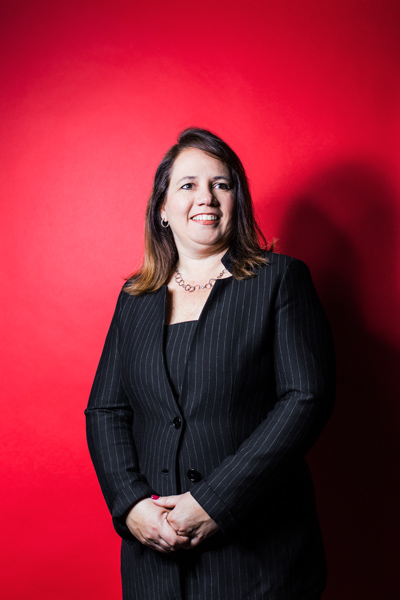
When Cushman & Wakefield, DTZ, and Cassidy Turley merged, a $6 billion company with few established procedures was born. Four months later, Sarah Winters joined the newly formed company as vice president, global head of tax, and was tasked with creating the company’s tax department from the ground up. “We had to create a new tax compliance process. We had to create a new global tax provision process. We had to create new payment processes, and we had to create processes for prioritizing projects,” Winters says. “You name it, and we had to create it.”
Winters was well-versed in mergers and acquisitions when she joined Cushman & Wakefield, a global real estate services firm. She spent the first eighteen years of her career as a consultant, specializing in international law and mergers and acquisitions. In 2012, she joined Walgreens as director, tax counsel international, and helped to structure the acquisition of the UK company Boots. She also helped build an international tax department for Walgreens, which at the time only operated in the United States.
During her time at Walgreens, Winters gained leadership experience in the front end of a major acquisition. The transition to Cushman & Wakefield offered her an opportunity to integrate and stabilize the newly merged companies on the back end and to build a tax strategy for the company going forward. “It was almost like a continuation of the story that I had started,” she says.
Cushman & Wakefield’s story began in 2014, when the private equity groups that now own the company bought DTZ, a UK-based company that operated in the European and Asian regions. Seeking to establish a global footprint, it acquired Cassidy Turley, which operated in the United States, later that year. In 2015, Cushman & Wakefield, a global company based in the United States, was put up for sale. “Our current owners decided they couldn’t pass up on the opportunity,” Winters says. They bought Cushman & Wakefield, doubling the size of the company and creating the third-largest global real estate company. They rebranded all three companies under the Cushman & Wakefield name, using the most widely recognized company name in global real estate.
When Winters joined Cushman & Wakefield in 2015, the company was, in many ways, still divided into three parts. There were three global headquarters, three enterprise resource planning systems, and three sets of processes for every procedure. It was Winters’s job to develop and implement an integration plan that would create a unified tax strategy. “There’s a small mold of what you have, but everything is pliable,” Winters says.
When developing processes, Winters and her team examined each historic company’s process and explored new potential solutions. One of the processes that they redefined was the tax provision process, which is necessary to complete the annual statement reporting process. Winters and her team reviewed various tax provision tools before choosing one of the softwares that the company had historically used. They upgraded the software with the new modules needed to accommodate the global footprint. Once they had that tool in place, Winters had to ensure that her team members could use it.
“As we hired new team members, we had to find team members that were proficient in that software. If not, I had to send them to training for it,” Winters explains. “In those regions where there is no tax provision specialist, we trained team members from other departments.”
Of Winters’s sixteen reports, only two were carried over from the historic companies. When building her new team, Winters chose team members with diverse experiences and big ideas. “What I looked for in candidates was making sure they would challenge the status quo and they could think strategically about how to enhance the business,” she says. “I want people in the tax department to be strategic thinkers and not necessarily compliant doers.”
The tax department was not alone in turning over its entire group. The newly formed company had an entirely new global leadership team, including the global finance department. Along with changing its team members, the company was changing its processes. While Winters was upgrading the tax software, IT and accounting were implementing new software, and the company was defining its new strategy. “I think, in a vacuum, what we tried to accomplish would have been fine—changing new software in a steady state. But we took on a lot of changes in a short period of time,” Winters says. “It was almost like we were changing the wheels on the bus while the bus was still moving.”
To establish the tax department’s place in the organization, Winters hired team members who could build strong relationships across departments. “Tax is so often seen as a crossfire instead of a value driver,” she says. “My team and I spend a lot of time building relationships with the business teams in the various regions and understanding what they do, how they do it, and determining how we can help them increase their earnings and improve
their efficiency.”
“When multiple entities come together, many challenges and opportunities arise. As global head of tax at the new Cushman & Wakefield, Sarah Winters is managing the challenges and maximizing value by bringing tax to the table through a collaborative, business-focused approach,” says Rick Emich, tax partner at PricewaterhouseCoopers.
To further solidify both intra- and interdepartmental relationships, Winters travels regularly to each region and espouses an open-door policy. She learned the value of relationship building when she left consulting and joined Walgreens. She had the technical skills to address tax issues. But on the consulting side she had sold services, whereas on the industry side, she was selling an approach. “You’re still always a sales person; it’s just you’re selling something differently,” she says. “You want people to buy into your strategy.”
At Cushman & Wakefield, Winters defined a strategy in which the tax department is a vital part of the company’s future. “Tax has a seat at the table at this company, and I think that’s because our tax department globally has built these one-on-one relationships, and our leadership team, especially the global CFO, has empowered and supported the team,” she says. “It’s exciting to know that when we decide to look at an acquisition, or we decide to go into a new line of business, that they think to call me or a team member and say, ‘This is what we’re thinking about. How can you add value?’”
Grant Thornton LLP understands that success is built on more than just talent; it takes passion and perseverance to achieve your vision. We are proud to recognize Sarah Winters on her accomplishments and contributions to the business community.
True Partners Consulting congratulates Sarah Winters, vice president and global head of tax at Cushman & Wakefield. We’re proud to support Sarah and her team as they continue to build a cutting-edge, forward-thinking, and future-ready tax department.
Photos: Gillian Fry

